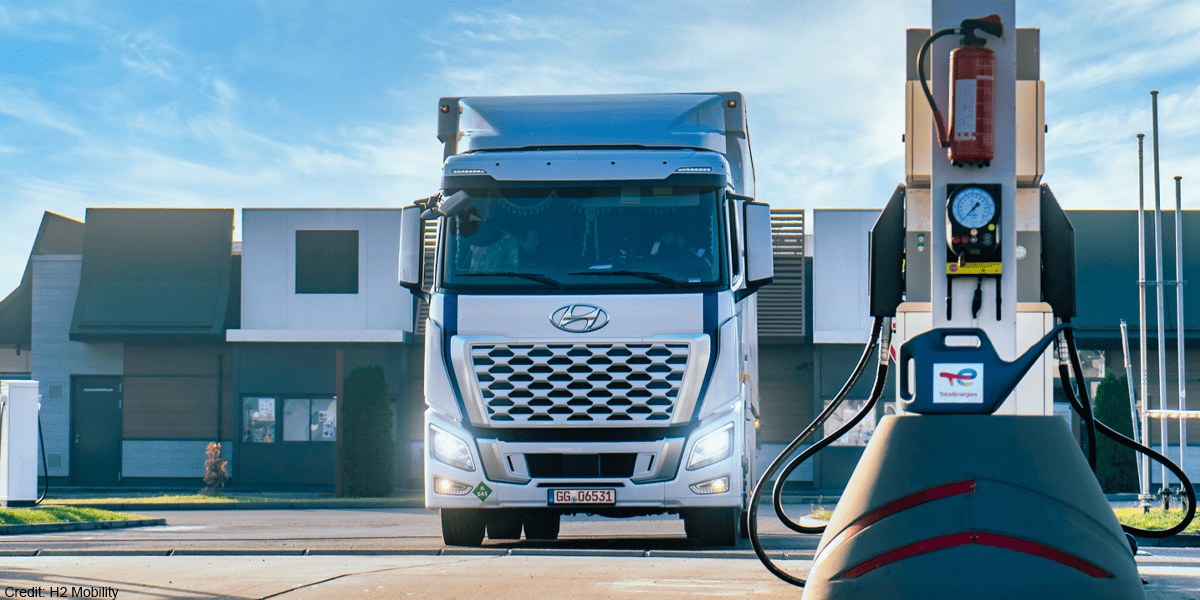
H2 Mobility has received an investment of over 110 million euros to enable its next phase of growth
First to the investment: Hy24 is contributing 70 million euros, the remaining 40 million euros will be borne by the existing shareholders, as Hy24 CEO Pierre-Etienne Franc said in an interview.
Hy24 is a merger of Ardian, Europe's largest private investment house, and the investment fund FiveT Hydrogen. The common goal is the scaling and thus commercialization of hydrogen mobility through an accelerated expansion of filling stations.
The new shareholder is coming "just in time for the start of the market ramp-up for light and medium-sized hydrogen commercial vehicles," as H2 Mobility announced. "We see great market potential in Germany and Europe," says Franc.
"That's why we're investing right now in order to push ahead with the expansion in parallel with the market premieres of various hydrogen commercial vehicles." And further: "We are an independent investor and make our decisions on this basis.
We are not an industrial company. With our financing, we are pursuing long-term, profit-oriented interests with an effective impact on the energy transition.”
At H2 Mobility, reference is not only made to the fact that an international investment fund is investing in the expansion of the hydrogen filling station infrastructure for the first time.
In the conversation, H2 Mobility Managing Director Nikolas Iwan also sees the investment by an external financial investor as "an important confirmation of our course". The amount of the investment together with the existing investors, which is unique in the field of hydrogen tank infrastructure in Europe, is also important.
Hydrogen capacity of filling stations will be increased fivefold
The expansion plan that is possible with the investment envisages expanding the currently just under 100 hydrogen filling stations in Germany to up to 300 filling stations by 2030.
What sounds like unambitious goals has a different background: Above all, H2 Mobility wants to significantly increase the capacity of the locations. Instead of the previous 200 kilograms of hydrogen per day, the larger stations are designed for one tonne of H2.
Since existing locations are also to be retrofitted, the tank capacity itself will be increased significantly more than the expansion to 300 locations suggests.
In addition, "selected existing systems as required" are to be retrofitted with 350 bar technology, which will enable trucks and buses to refuel there. However, the fuel cell cars that some of the earlier stations were designed for operate at 700 bar. Both were possible at numerous locations, but at some only car refueling at 700 bar.
"The focus is currently on hydrogen commercial vehicles, from vans to trucks," says Iwan. “We are therefore also retrofitting existing locations to also offer refueling at 350 bar if it is not already available. At the same time, we are keeping the door open for the passenger car sector.”
The H2 Mobility Managing Director is primarily alluding to BMW's plans. According to information from mid-March , the company intends to cover “an increasing proportion of the drive mix” with hydrogen fuel cells from the second half of the decade.
At the moment it is only known that the iX5 Hydrogen will go into small series later this year. Possible production models with fuel cells from BMW have not yet been confirmed. The other two car manufacturers with fuel cell cars, Hyundai and Kia, currently only have one car with the technology in their range, but use the fuel cell (partly through cooperation) in numerous commercial vehicles.
In order to support large-scale production, BMW recently called for a denser network of 700-bar filling stations, specifically every 100 kilometers along the autobahn by 2027 instead of every 150 kilometers. With a view to the vehicles that will be announced in the near future, Nikolas Ivan believes it is right to also spend money on the 350-bar technology.
Incidentally, Iwan is not concerned that Daimler Truck, one of the shareholders in H2 Mobility, is openly in favor of the use of liquid hydrogen, i.e. hydrogen cooled to -253 degrees Celsius, instead of the gas stored under pressure.
"It is a great advantage that Daimler Truck is one of our shareholders, so we are constantly in close contact with various technologies and can react early on," says the managing director.
The new locations will certainly also close some gaps on the map, but H2 Mobility wants to focus primarily on regions with high demand.
This should not only shorten the distances for companies with H2 vehicles in their fleet, but above all also offer reliability thanks to alternatives in the region. Reliability is extremely important for corporate customers.